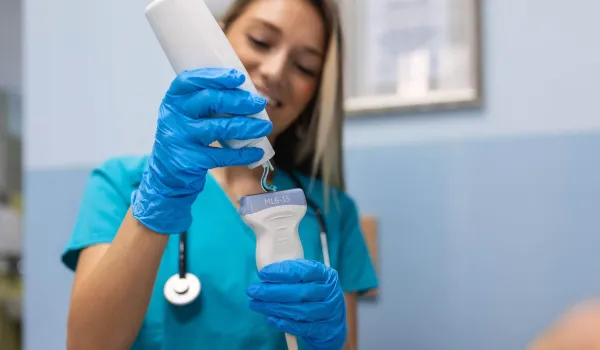
In 2021, the COVID-19 pandemic continued to impact nearly every area of healthcare, from staffing to technology. Here in 2022, healthcare trends may shift to finding new ways — particularly with technology — to deliver quality services as the pandemic continues. If you're interested in joining the healthcare industry after completing a degree or diploma education program, such as vocational nursing or patient care, it's important to understand the trends that may impact your future career. Here are some of the biggest healthcare trends of 2022.
Increase in Telemedicine Services
Though telemedicine has existed for several years, it has become a vital service during the COVID-19 pandemic. Many people are now choosing to make virtual appointments to see their healthcare providers from the comfort of their own homes. With patients and providers
becoming more comfortable with this method of care, it's likely to become an even larger trend in 2022. There are many benefits of telemedicine services. According to Johns Hopkins Medicine (1), virtual healthcare visits offer convenience for patients, who may be able to schedule appointments without having to take time off work or arrange for child care. Telemedicine services also help doctors observe patients in their home environments, leading to better patient assessments.
In 2022, expect to see healthcare providers offer and promote telemedicine services to their patients more frequently. While the COVID-19 pandemic initially increased the need for virtual healthcare, the focus will now shift to integrating telemedicine in many areas of the healthcare system to improve patient outcomes.
Emphasis on Personal Data
With many people now tracking their health information on their phones or wearable devices, healthcare providers are looking to use that information to help their patients. In 2022, expect to see an emphasis on the industry using personal data for patient care. More healthcare providers may encourage their patients to use wearable devices or other technology to track their health journeys.
Patients now have so much information at their fingertips, which can help them feel empowered to manage their own health. They may feel more comfortable sharing this data with their healthcare providers, which can have long-term benefits for their care. Healthcare
providers can use this data and information to take a more patient-focused approach to healthcare, refining their operations to meet the unique needs of each patient.
Use of Technology to Achieve Healthcare Equity
Technology continues to advance healthcare in many ways. In 2022, there's likely to be a greater push to use technology to achieve healthcare equity. This equity means every patient has the same opportunity to maintain and improve their own health. Many believe technology can help remove many obstacles people may face in their healthcare journeys, such as poverty and discrimination.
One way technology may help improve healthcare equity is by sharing insights gained from healthcare data. Many technologists and data scientists are already working to gather information and develop algorithms to help them analyze vast amounts of clinical data. The next step is determining a strategy to incorporate this data into patients' healthcare plans.
Other technology tools, such as machine learning, can likely help healthcare systems gather information to share with others about health equity. When healthcare providers have access to this data, they can use it to gain insights into healthcare discrepancies among different populations. By studying and analyzing this data, healthcare systems can use this information to make their services more accessible and deliver optimal care for every patient.
More AI Technology
Healthcare systems continue to explore artificial intelligence (AI) technology and other digital tools to improve their operations. In 2022, it's likely these systems will develop and implement
new strategies for using AI technology. Some tools, such as natural language processors, chatbots, and text mining, are already available for providers. More healthcare systems may choose to invest in software so they can use this existing technology in their own operations.
Another trend for AI technology in 2022 may be an increased emphasis on using these tools for preventive care. Artificial intelligence tools can help systems analyze clinical data, such as laboratory and diagnostic results, to help healthcare providers determine the most effective plans for patients.
In the future, it's possible AI technology can help healthcare systems develop digital models of their patients to improve their quality of care. Before a patient receives any treatment, healthcare providers may test treatments on the digital model to determine its effectiveness. The opportunities for artificial intelligence and machine learning in the healthcare industry are endless, and this technology is likely to be a significant trend for 2022 and for many years to come.
Focus on Mental and Emotional Health
One positive outcome of the COVID-19 pandemic is the increase in people seeking mental health resources. The pandemic has helped highlight the importance of finding care to improve mental and emotional health outcomes. In 2022, there's likely to be a continued increase in the need for mental healthcare providers and quality resources.
As the pandemic continues, more Americans continue to report high levels of anxiety and depression. According to Mental Health America (2), 47.1 million people in the U.S. are now
living with a mental health condition, an increase of 1.5 million people since the previous year. To treat those people, healthcare systems may place a greater emphasis on outreach to help patients find the care they need.
Many companies already provide mental health resources to their employees, such as employee assistance programs. Over the next year, employers may continue to search for new ways to offer help to their employees, particularly as many return to their offices after working from home since the pandemic started. Improving the quality of mental health resources is likely to be a major healthcare trend in 2022.
Start Your Educational Path for a Career in Healthcare
If you're interested in pursuing a career in healthcare, Concorde can help you achieve your goals. At Concorde, students can train for a career in healthcare in months, rather than years. Explore our various healthcare education programs in nursing, patient care, allied health, and diagnostics to find one that matches your goals and interests. Contact Concorde to request more information, schedule a tour, or apply online today.
Take The Next Step Towards a Brighter Future
We have a Concorde representative ready to talk about what matters most to you. Get answers about start dates, curriculum, financial aid, scholarships and more!




